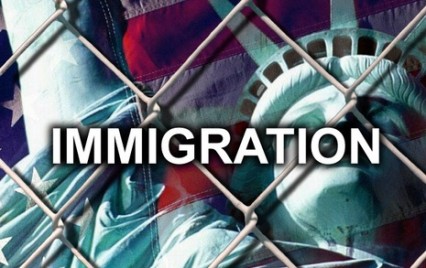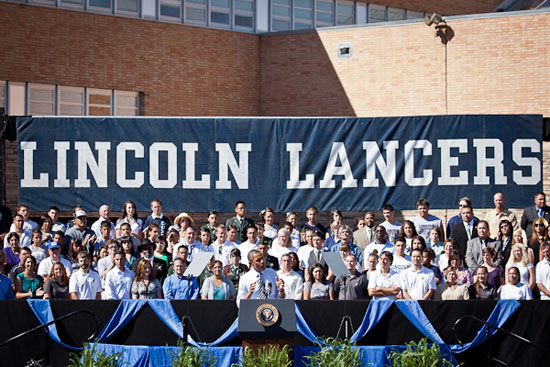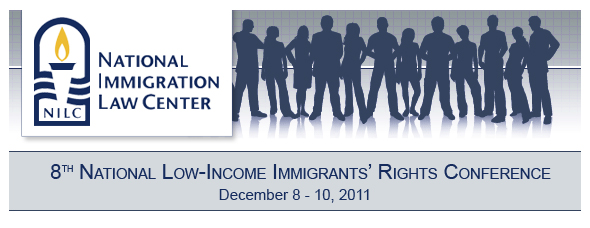Our friends at the Immigration Policy Center have some advice for anyone who is either engaging in a debate, have to answers tough questions on immigration or if you simply want to know the facts. Please take a moment and “Like” their Facebook page because they are fabulous and release timely and important information on immigration. And if you haven’t liked our Facebook page, please stop by and say hello too!
SURVIVING IMMIGRATION INTERROGATIONS
Below you’ll find some quick answers to the toughest immigration questions:
Solving Unauthorized Immigration:
Q: “What are you going to do about illegal immigration?”
A: Immigration reform must be tough, practical, and smart. It is unacceptable to have 11 million people in our country living outside the legal system, and Americans know we can’t deport 11 million people to solve the problem.
America wins when we face reality and take action on immigration. Realistic solutions require the U.S. to do more than secure the border, crack down on employers who operate outside the law, and pursue smugglers who profit from our broken immigration system. We must address the underlying causes of unauthorized immigration. Moreover, reform won’t work unless we address the 11 million immigrants living here without legal status. We must require them to come forward to legalize their status, pay back taxes, learn English, and pass criminal background checks.
America needs a legal immigration system that enhances our security, strengthens our economy, and benefits our communities. We need a realistic, legal immigration framework that protects U.S. workers while providing needed labor to American businesses. Reasonable limits on family immigration would encourage the unification of families and the building of stable communities. The foundation for this kind of immigration system is strong and sensible enforcement that disentangles immigration from crime and national security threats, and focuses enforcement efforts on weeding out the bad actors in the workplace and our communities.
Border Control:
Q: “How will you control the border?”
A: Securing our border is vital for national security, but we can’t deport our way to safety. We must supply adequate manpower and groundbreaking technology to secure the border, but we can’t be lulled into thinking that enforcement alone will control the border. Walls, raids, and billions of dollars spent at the border aren’t stopping unauthorized immigration. The annual budget of the U.S. Border Patrol has increased nine-fold, and the number of Border Patrol agents stationed along the southwest border has grown nearly five-fold, since Fiscal Year (FY) 1992. But the unauthorized population of the United States has tripled in size, from roughly 3.5 million in 1990 to 11 million today. America needs leaders who will move beyond the deportation-only mentality and implement real solutions to secure the border and restore the rule of law. Enacting comprehensive immigration reform and creating legal channels so that immigrants entering our borders do so lawfully will free up the Border Patrol to focus on drug smuggling, human trafficking, and other criminal activity rather than chasing busboys through the desert.
Immigrants and the Economy:
Q: “Should we pass immigration reform while we’re in an economic downturn?”
A: In this economic downturn, many may argue that immigration reform is not a priority, but reforming our broken immigration system is an important part of our economic recovery. A recent study by Dr. Raul Hinojosa-Ojeda found that comprehensive immigration reform which includes the legalization of unauthorized immigrants already in the U.S. would yield $1.5 trillion to the U.S. GDP over a ten-year period, generate billions in additional tax revenue and consumer spending, and support hundreds of thousands of jobs. Currently, many unauthorized immigrants are working in the underground economy, and unscrupulous employers are able to exploit them and create unfair competition by violating labor laws and paying sub-minimal wages. We need to make sure everyone working in the U.S. is working legally, and we need to enforce labor laws against employers who undercut U.S. workers and exploit unauthorized immigrants. Leveling the playing field for both workers and employers will eliminate unfair competition and improve the wages and working conditions of all workers. Putting all immigrant workers in the formal economy will increase wages, tax revenues, and consumption.
Immigrants and Taxes:
Q: “Is it true that illegal immigrants don’t pay taxes and drain our economy?”
A: As Ben Franklin said, “Nothing is certain but death and taxes.” Like the rest of us, unauthorized immigrants pay taxes on their property and anything they buy. More than half of them have taxes taken out of their paychecks, but because our immigration system is dysfunctional, these taxes are paid under false Social Security numbers. We need a new regimen in which we know who is paying taxes and can ensure that no one is getting a free ride. The only way to do that is to pull unauthorized immigrants out of the shadows and get them on the right side of the law.
Three state-level studies have found that unauthorized immigrants pay more in taxes than they use in benefits. In Iowa, unauthorized immigrants pay an estimated $40 to $62 million in state taxes, while they and their employers contribute an additional $50 million to $77.8 million in federal, Social Security, and Medicare taxes from which they will never benefit. In Oregon, unauthorized immigrants—who are not eligible for any state benefits—pay between $134 million and $187 million in taxes each year. Finally, in Texas, the State Comptroller found that, without unauthorized residents, the gross state product in 2005 would have been $17.7 billion less.
Birthright Citizenship:
Q: “Wouldn’t eliminating birthright citizenship resolve our immigration problems?”
A: Eliminating birthright citizenship would be unconstitutional, impractical, expensive, complicated, and would not stop unauthorized immigration. It would impose a significant burden on all Americans who would no longer have an easy and inexpensive way to prove their citizenship. All American parents—not just immigrants—would have to prove the citizenship of their children through a cumbersome process. Since children born to unauthorized immigrants would presumably be unauthorized, the size of the unauthorized population would actually increase as a result of the new policy.
State-Level Immigration Legislation:
Q: “Should my state pass legislation similar to Arizona’s SB 1070?”
A: No. Such laws are not effective at resolving the problems with our broken immigration system. Only the federal government can reform our immigration laws. Laws like SB 1070 are expensive, devote precious law-enforcement resources to questioning immigrants about their status, and divert law-enforcement resources away from investigating serious criminal activity. SB 1070-like laws can also lead to racial profiling and discriminatory behavior. Police already have the ability to arrest immigrants for any crimes they may commit, and they can already cooperate with the federal government to enforce immigration laws.
While people are genuinely frustrated over the failure of the federal government to fix our broken immigration system, creating a patchwork of potentially unconstitutional and confusing laws is not an answer. A recent poll conducted by Politico shows that people don’t necessarily want states to jump into the fray as much as they want solutions. While 23% of respondents supported states taking action, 61% supported passing comprehensive immigration reform through Congress. A CNN poll showed that while 55% of Americans favored SB 1070, an astounding 81% supported a plan that would legalize unauthorized immigrants if they had a job and paid back taxes.
Immigrants and Crime:
Q: “Aren’t a lot of immigrants criminals?”
A: Immigrants are less likely to be criminals than the native-born. Americans are justifiably concerned about crime in their neighborhoods, and immigration restrictionists are quick to point the spotlight at cases in which immigrants have committed horrible crimes. Anyone who commits a crime should be punished, but there is ample evidence that immigrants are less likely than the native-born to be in prison, and high rates of immigration are not associated with higher rates of crime. In fact, the incarceration rate for native-born men age 18-39 was five times higher than for immigrant men in 2000.
Recent studies in two immigrant-rich states, New Jersey and California, reached similar conclusions. In New Jersey, U.S. citizens are twice as likely to land in prison as either legal or unauthorized immigrants. And in California, foreign-born adults have lower incarceration rates than their native-born counterparts.
Immigrants and Integration:
Q: “Why aren’t new immigrants assimilating like our ancestors did?”
A: Learning English, swearing allegiance, and buying homes—what could be more American? Roughly 92% of all people in the United States spoke English “very well” in 2008. Immigrants know the ticket to success in this country is speaking English, and that’s why sociologists have dubbed America the “language grave-yard.” Large and increasing numbers of immigrants are also becoming U.S. citizens. Roughly 570,000 immigrants applied for naturalization in 2008 alone (in the 1960s the annual average was 120,000). Finally, rates of homeownership—a key indicator of entry into the American middle class—rise among immigrants the longer they are in the country.
We need integration policies for the new century. As our communities become more diverse, we need to facilitate the quick integration of newcomers. Right now, there are long lines to get into English classes—immigrants want to learn English, but we need more teachers and resources to help them do so. We need to encourage all eligible immigrants to become U.S. citizens, and we must ensure that the Department of Homeland Security can process their applications accurately and rapidly. One huge impediment to integration is lack of legal status. It’s harder to integrate when you don’t have papers. If we require all unauthorized immigrants to legalize their status, and if we reform our immigration system so that all immigrants are here legally, it will be easier for them to integrate into U.S. society.
Immigrants and Welfare:
Q: “Aren’t immigrants using a lot of public benefits?”
A: Immigrants are not the welfare queens that restrictionists would have you believe. The truth is that unauthorized immigrants are not eligible for most public benefits, and even legal immigrants are limited in what they can receive. Most legal immigrants cannot receive federal Medicaid, Temporary Assistance to Needy Families (TANF), Supplemental Security Income (SSI), or food stamps during their first five years or longer in the United States—regardless of how long they have worked or how much they have paid in taxes. Even when they are eligible for certain programs, experts say that low-income immigrants are less likely to receive public benefits than are U.S. citizens.
Immigrants and the Environment:
Q: “I’ve heard immigrants are destroying the environment. Is that true?”
A: It’s the American lifestyle, not immigrants. Restrictionists like to point the finger at immigrants, saying that they contribute to population growth and damage the environment. What they don’t tell you is that our impact on the environment is determined not just by our numbers, but by how we use resources—our systems of production and consumption and the policies that shape them. Immigrants are not the problem—the U.S. lifestyle, use of resources, and CO2 emissions are the problem. We can’t single out immigrants as a cause of increased CO2 emissions in the United States. Using the restrictionists’ rationale, we could choose any group of Americans—the wealthy, residents of a particular state, dog owners, accountants, redheads—and argue that eliminating that group would lower emissions. Curbing immigration is not a solution to our very real environmental problems. We need rational solutions to global climate change issues. Simplistically blaming them on immigrants is not productive.
















